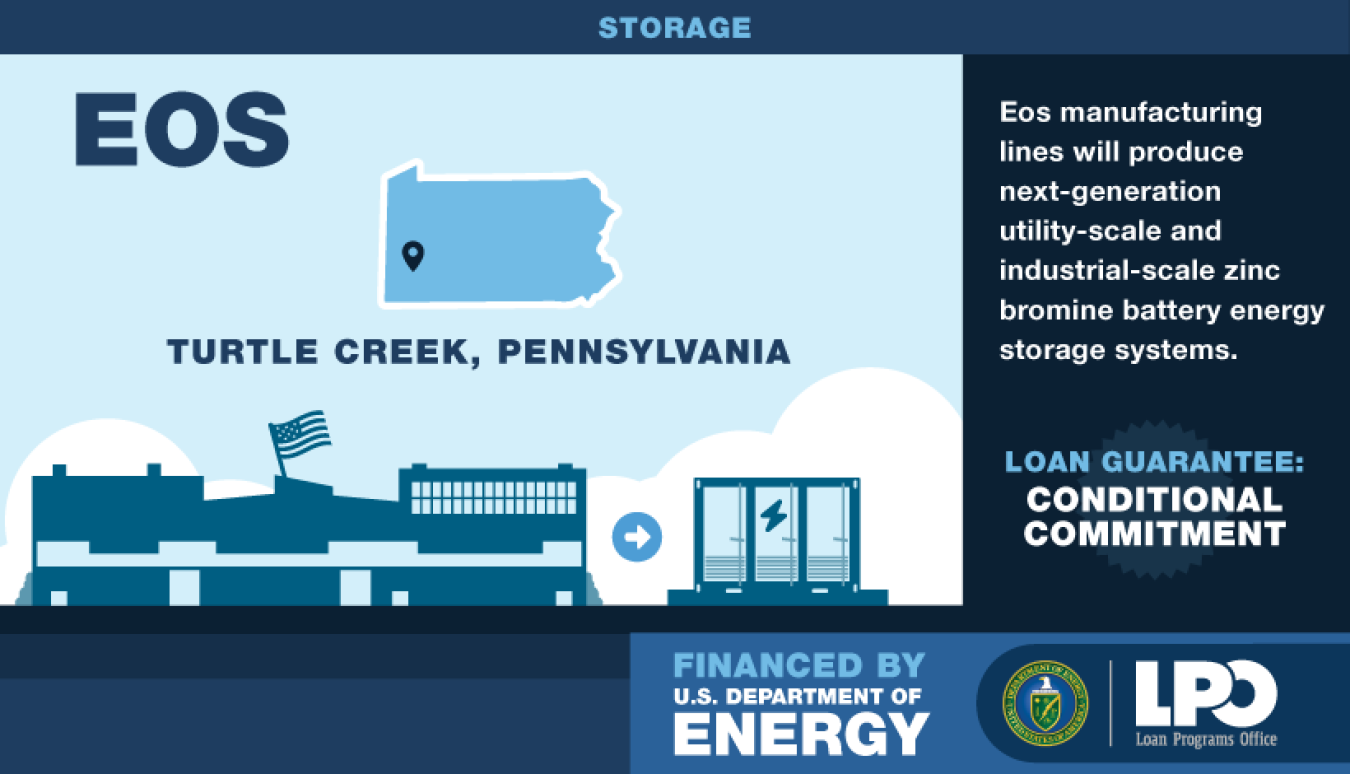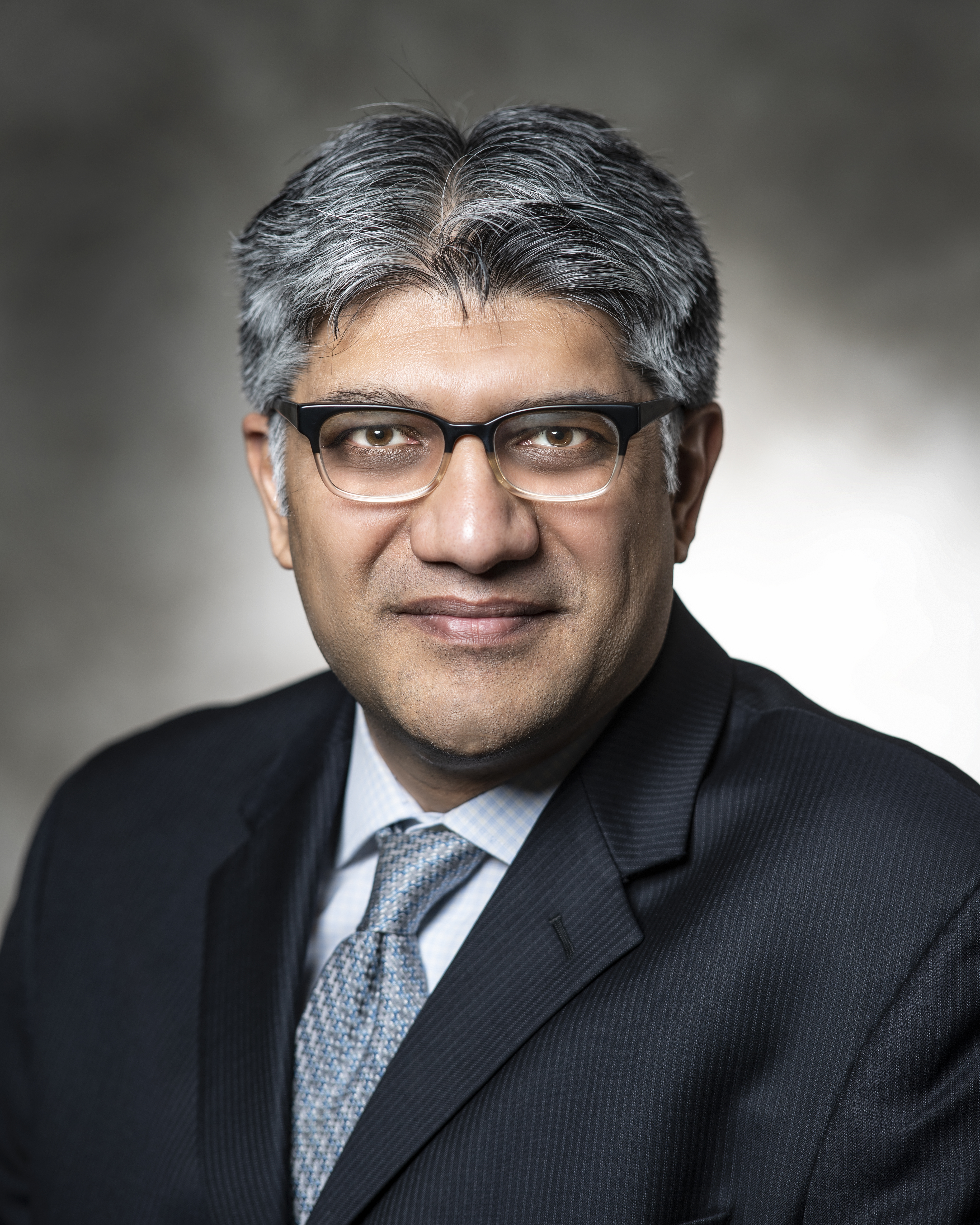LPO has offered a conditional commitment to Eos Energy Enterprises, Inc. for an up to $398.6 million loan guarantee for the construction of up to four state-of-the-art production lines to produce the “Eos Z3™".
Office of Energy Dominance Financing
August 31, 2023
Today, the U.S. Department of Energy’s (DOE) Loan Programs Office (LPO) announced a conditional commitment to Eos Energy Enterprises, Inc. (Eos) for an up to $398.6 million loan guarantee for the construction of up to four state-of-the-art production lines to produce the “Eos Z3™,” a next-generation utility- and industrial-scale zinc-bromine battery energy storage systems (BESS) in Turtle Creek, Pennsylvania.
If finalized, the project is expected to manufacture 8 GWh of storage capacity annually by 2026. That is enough to provide electricity to over 300,000 average U.S. homes instantaneously or meet the annual electricity needs of approximately 130,000 homes if fully charged and discharged daily. The project is expected to create up to 50 union contractor construction jobs and as many as 650 new operations jobs when at full operational capacity.
This project supports President Biden’s Investing in America agenda to onshore and re-shore domestic manufacturing of critical technologies—like BESS—essential to building a clean energy future and strengthening America’s energy security. Leveraging loan authority from the President’s Inflation Reduction Act, the LPO is spurring billions in public-private investments to boost the nation’s competitiveness, strengthen supply chains, and create good-paying jobs to power the clean energy economy.
Investing in America is a key pillar of Bidenomics: growing the American economy from the bottom up and middle-out—from rebuilding our nation’s infrastructure, to creating a manufacturing and innovation boom powered by good-paying jobs that don’t require a four-year degree, to building a clean-energy economy that will combat climate change and make our communities more resilient.
Today’s energy storage market is nascent but rapidly growing and is dominated by lithium-ion and lithium iron phosphate battery technologies, which typically serve short-term duration applications (approximately 4 hours).
Eos’s zinc-bromine Eos Z3™ batteries provide alternative battery chemistry to lithium-ion, lead-acid, sodium-sulfur, and vanadium redox chemistries for stationary battery storage applications. Eos’s technology is also specifically designed for long-duration grid-scale stationary battery storage that can assist in meeting the energy grids’ growing demand with increasing amounts of renewable energy penetration. Critically, Eos batteries are non-flammable and do not require active cooling to operate. The batteries can achieve 100% depth of discharge, do not degrade based on age, and are rated for 6,000 charge/discharge cycles (~20 years of use) before degradation. Eos already manufactures a zinc-bromine battery; if finalized, LPO financing will help develop the next-generation battery system, the Eos Z3, which are expected to be more energy dense and cost-efficient to produce than Eos’s previous models.
The project’s intellectual property is based in the United States. Moreover, Eos over time expects to source nearly 100% of the materials supply for the Eos Z3 battery from the United States. The product is also better insulated from market volatility and supply chain risk that challenge other battery chemistries by forgoing scarce critical minerals such as lithium, which are largely imported.
Additionally, grid-scale storage will allow utilities and industrial customers to store clean energy when there is a surplus and use it when energy is relatively more expensive or clean power is unavailable. BESS can provide numerous grid functions, including an alternative to fossil fuel electricity generation during demand spikes, being a lower-cost option during normal demand, and providing backup power.
The jobs created by the project would be based primarily in Turtle Creek, Pennsylvania, with hourly wages paid at least at the prevailing wage and competitive internship and apprenticeship salaries. In addition, LPO works with all borrowers to create good-paying jobs with strong labor standards during construction, operations, and throughout the life of the loan including developing strong Community Benefits Plans.
Eos began community outreach efforts in 2022 to economic and workforce development leaders, educational institutions, and state and local governments—including Allegheny Conference on Community Development and its economic development affiliate the Pittsburgh Regional Alliance, The Heinz Endowment and The Mon Metro Chamber of Commerce, among others—to ensure community engagement in the project and to attract a strong local workforce. Eos has created a Clean Energy Careers Program to target local high schools, vocational schools, and trade schools to attract students to apprenticeship opportunities; to provide internship opportunities for 2- or 4-year college and high school students to learn skills from Eos welders, chemical engineers, and other professionals, opening up potential long-term career pathways for those students; and to raise awareness of career opportunities at Eos with local veteran groups, literacy centers, and within the nonprofit community.
Turtle Creek and nearby communities are DOE-identified disadvantaged communities (DACs), and the project is situated on a former Westinghouse Electric Corporation campus. The company’s current workforce is diverse across race, gender, and veteran status, and Eos is committed to growing its diverse, equitable, and inclusive team. The project’s support for overburdened and underserved communities and their workers aligns with the Biden-Harris Administration’s to ensure at least 40% of the benefits of federal clean energy investments go to DOE-identified DACs.
The LPO financing would be offered through LPO’s Title 17 Clean Energy Financing Program, which includes financing opportunities for innovative energy and supply chain projects like Eos’s and certain state-supported projects and projects that reinvest in existing energy infrastructure.
While this conditional commitment demonstrates the Department’s intent to finance the project, several steps remain for the project to reach critical milestones, and certain technical, legal and financial conditions must be satisfied and diligenced to the satisfaction of DOE before the Department enters into definitive financing documents and funds the loan.


